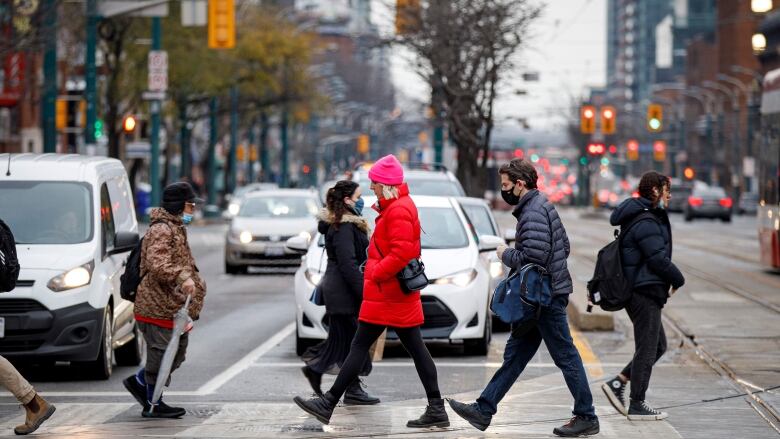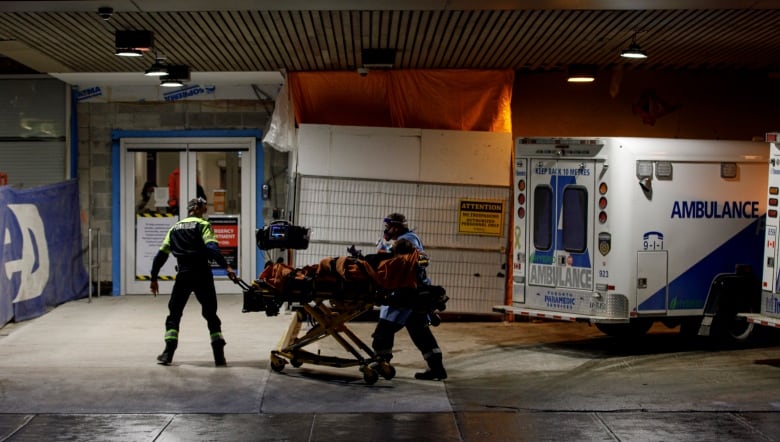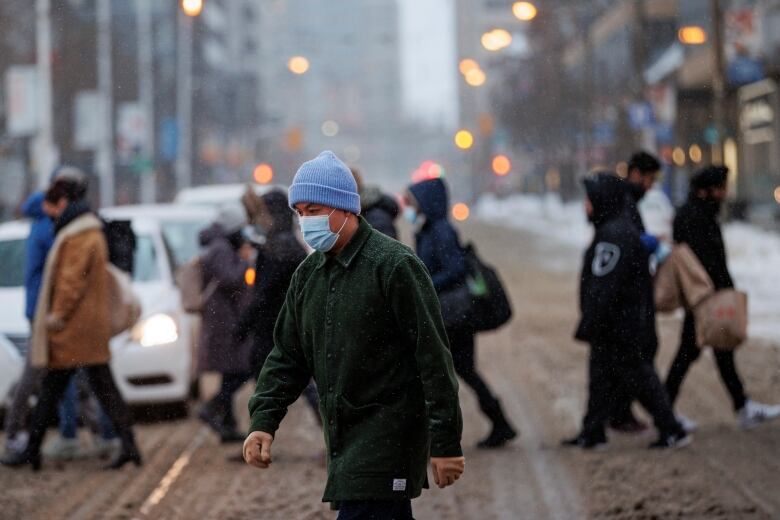Omicron completely changed the pandemic. Are we prepared for what's next?
'Omicron was a giant step in the wrong direction of where we wanted to go,' says Dr. Anthony Fauci

This is an excerpt from Second Opinion, ananalysis of health and medical science news emailed to subscribers weekly. If you haven't subscribed, you can do that by clickinghere.
Omicron completely changed everything we thought we knew about COVID-19 when it unexpectedly emerged a year ago and rapidlyspread around the world within weeks and there's still so much uncertainty around what it could do next.
The devastatingly infectious variant upended our priorunderstanding of what the virus was capable of and how to effectively control it, and opened the door to previously unheard of levels of COVID-19 transmission, seemingly overnight.
"Omicron was a giant step in the wrong direction of where we wanted to go," Dr. Anthony Fauci, the outgoing director of the U.S. National Institute for Allergy and Infectious Diseases (NIAID) and the chief medical advisor to the U.S. President, told CBC News in an interview.
"It was highly significant in changing the pandemic because it really was quite different from the emergence of other variants which actually werein many respectsclosely related [to each other]," he added. "Omicron was a truly aberrant variant it veered way off."
Fauci said that because it was so far removed from previous variants, Omicron had the innate ability to evadethe immune protection from prior COVID infection and vaccination and left us extremely vulnerable to massive amounts of transmission.
"Omicron changed the game," Dr. Maria Van Kerkhove, an infectious diseases epidemiologist and the World Health Organization's COVID-19 technical lead, said in an interview with CBC News.
"The sheer volume of cases that countries experienced and how each of the waves were synchronous around the world we didn't see that before."
But could more have been done to slow the spread of Omicron and its highly contagious subvariants, or to stop them altogether? Will our population immunity hold up to its next moves? And are we better positioned now for the next Omicron-like variant?
These aren't easy questions to answer, but some of the top global infectious disease experts, epidemiologists, virologists and immunologists on the front lines of the pandemic have weighed in on what we've been through with Omicron and what we can expect next.
Omicron killed at least one million people worldwide
Bill Hanage, an epidemiologist at Harvard's T.H. Chan School of Public Health in Boston, said when Omicron first emerged many experts were cautiously optimistic at the time due to the immunity in the population and the fact children were soon eligible for vaccination."And then Omicron came along and flipped the script," he said.
"Less than a month after it was first reported, it was the majority of cases here and that's just extraordinary."
Van Kerkhove said it was quickly clear Omicron was distinct from other variants like Alpha, Beta and Delta because of the dozens of mutations it had that allowed it to spread much more effectively, leading the WHO to almost immediately classify it as a variant of concern.
"The numbers of cases were extraordinary," she said. "And while we did see less rates of hospitalization of Omicron compared to Delta, in some countries deaths were higher during Omicron than in Delta because there were so many people that were infected."
Between January and August of 2022 alone, Van Kerkhove said at least one million people around the world died from Omicron and its subvariants BA.2, BA.4 and BA.5.
"And we know these estimates are gross underestimates," she said. "So it was a game changer in the sense that it was really driven by massive amounts of transmission."

Canada faced 'major impact' from Omicron
Canada was quickly caught off guard by Omicron in early December of last year, when cases rapidly spread to multiple provinces with no known link to international travel, driving massive outbreaks across the country.
Within weeks, Canada's COVID testing capacity was completely overwhelmed leaving the country flying blind in a never-before-seen surge of infection that led some provinces to reinstate curfews, shutter bars and restaurants and move schooling back online.
Omicron rapidly shifted the need for boosters across Canada in a desperate attempt to protect the vulnerable and fend off worsening spread of the variant, but by early January COVID hospitalizations had reached record highs in much of the country.
Despite our best efforts, Omicron was a runaway train heading straight for us.
"I'm not really sure what could have been done," Fauci said, when asked how countries around the world could have better prepared for the impact of Omicron, given that even China has failed to contain it with draconian public health measures.
"I'm really not sure whether anything could have been done."
Most Canadians got it, despite public health restrictions
A new study published in the Canadian Medical Association Journal this week that analyzed thousands of blood samples in British Columbia found a massive shift in the level of infection after Omicron made landfall in Canada last year.
By September 2021, fewer than 15 per cent had evidence of antibodies from previous infection. But by March 2022, after the first massive Omicron wave ripped through the population, close to 40 per cent of the population had evidence of a previous infection in British Columbia.
"There are really two major exposures that were game changers at different stages of the pandemic," said Dr. Danuta Skowronski, epidemiology lead at the BCCDC and lead investigator of the research.
The first was the availability of vaccines in 2021, and the second was the "major impact of infection due to Omicron," Skowronski said, which completely changed the population immunity landscape.
By August, the researchers found more than 60 per cent of the B.C. population tested had antibodies from prior infection.
The data was also broken down by age groups and found the highest level of infections by far were in Canadians under 19, with at least 70 to 80 per cent of youth showing evidence of prior infection, but fewer than half of adults aged 60years and older had been infected.
"By August of 2022, the majority of children and young adults have evidence of both infections and vaccine-induced antibodies," said Skowronski. "And where that remains low in terms of infection-induced antibodies is in the elderly."
The research also coincides with national data from the federal government's COVID-19 Immunity Task Force that suggests more than 70 per cent of Canadians from coast to coast had been previously infected up to October 15 a massive increase over the past year.
That means during the entire Omicron era off the pandemic, including when subvariants BA.2, BA.4 and BA.5 circulated, at least 25 million Canadians were infected between Dec. 1, 2021 and Oct. 1, 2022 regardless of public health restrictions in place.
Is the next Omicron on the horizon?
Omicron has shown no sign of slowing down and continues to rapidly mutate and generate new subvariants with immune-evasive properties like BQ.1.1, BQ.1, BA.2.75.2 and XBB, some of which make up the mosaic of strains currently circulating in Canada.
"Although there's still a lot of interesting evolutionary stuff happening with SARS-CoV-2, it's unclear how consequential this all is compared to, say, the initial emergence of Omicron," said Dr. Tom Peacock, a virologist at Imperial College London.
"The big worry is still something entirely distinct emerging, similar to what Omicron did a year ago," he said.
"We have no idea how likely this would be as we only have a single example of an 'Omicron-like event' it could happen tomorrow or it could happen in 10 years' time but clearly we shouldn't be complacent."
Dr. Allison McGeer, a medical microbiologist and infectious disease specialist at Toronto's Mount Sinai Hospital who worked on the front lines of the SARS epidemic in 2003, said a new variant of concern (expected to be named Pi) could come, but it could also not.
"Pi might come, right? Every day without Pi is a good day, but it might not last," she said.
"It's a characteristic of pandemics that, at the beginning, you get Omicron-like episodes of stuff that's evolved from the beginning, but that's supposed to stop but it's not like we have a very large sample size of experience to tell us what will happen."
Fauci said trying to predict Omicron's next move is an "unanswerable question" that is dependent on the amount of virus spreading globally that could drivemore mutations.
"We could be lucky where we continue to get variants, but they don't veer off too much from the previous variant ... and that there's enough cross-protection from either prior infection or prior infection together with vaccination," he said.
"That would be nice. I hope that's what we're going to see."
But Fauci said the other stark possibility is that we wind up with the emergence of a new variant that is as far removed from Omicron as Omicron was from Delta.
"We don't know and the best way to prevent that from happening is to get as many people vaccinated so that you bring down the level of transmission and disease to a low enough level that it doesn't have an overwhelming opportunity," Fauci said.
"The other thing we can do, and this is what we're trying to do, is to develop better vaccines, develop vaccines that have a greater breadth of protection, so that it protects against essentially all variants of SARS-CoV-2. There's a lot of work going on with that."
Need for better vaccines
Akiko Iwasaki, a professor of immunobiology at the Yale School of Medicine, is working on an experimental nasal vaccine with the goal of providing additional immune protection in those previously injected with mRNA vaccines.
In a recent article published in Science, her team's vaccine showed early promise by appearing to reduce the spread of the virus in hamsters, but her research has been hampered by a lack of funding since the U.S.'s Operation Warp Speed program ended.
That means it could take sometime before COVID vaccination technology is updated to better target circulating strains more effectively to prevent infection, or for a pancoronavirus vaccine that targets all known strains of SARS-CoV-2.
So where does that leave us?
"The combination of immunity generated from vaccines and infection is probably providing us, at least within this window, somewhat of an immunity that prevents the next big waves," she said.
"But we don't know what happens next. I mean, there may be further evasive variants from a very different sequence that could potentially come out that would require adjusted boosters."

Fauci said we face an "uphill battle" in weathering future waves of COVID given the "profound degree of fatigue" in the population.
"Everybody's tired of COVID. They want to put it in the rearview mirror, they want to be over with it," he said. "But unfortunately, COVID is not over with us."
With a file from Lauren Pelley
















_(720p).jpg)


 OFFICIAL HD MUSIC VIDEO.jpg)
.jpg)



























































































